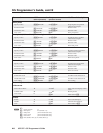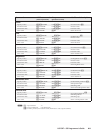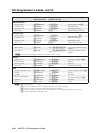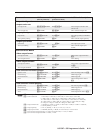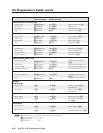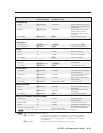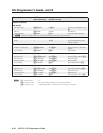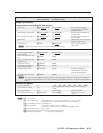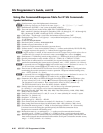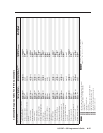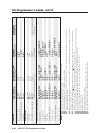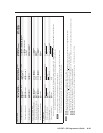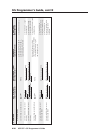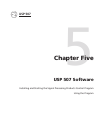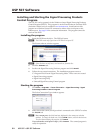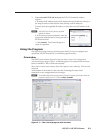
SIS Programmer’s Guide, cont’d
USP 507 • SIS Programmer’s Guide
4-16
Using the Command/Response Table for IP SIS Commands
Symbol definitions
X10)
= Switcher name, up to 240 alphanumeric characters.
N
The following characters are invalid in the name: {space} ~ , _ @ = ` [ ] { } < > ‘ “ ; : | \ and ?.
X10!
= Default name: (USP 507- + last 3 pairs of the MAC address)
X10@
= Time and date (for set) in the format: MM/DD/YY•HH:MM:SS
where:
MM = month: 01 (January) through 12 (December), DD = 01 through 31, YY = 00 through 99,
HH = 00 through 24, MM = 00 through 59, SS = 00 through 59
X10$
= GMT offset: –12.0 through +14.0, hours and minutes removed from GMT
X10%
= Daylight Saving Time: 0 = off/ignore, 1 = on (northern hemisphere), 2 = on (Europe),
3 = on (Brazil)
X10^
= IP address: ###.###.###.###
X10&
= Hardware (MAC) address: ##-##-##-##-##-##
X10*
= Number of open connections: 0 - 255
X10(
= Password: 12 alphanumeric characters (see note above)
X12#
= Verbose mode: 0 = clear/none (default, Telnet), 1 = verbose mode (default, RS-232/RS-422),
2 = tagged responses for queries, 3 = verbose mode/tagged for queries.
N
If tagged responses is enabled, all read commands return the constant string and the value as the set
command does (for example, the read matrix name command
E
CN
}
, returns Ipn•
X7)]
)
.
X12$
= RAM status: 0 = RAM dirty (needs saving to flash), 1 = RAM saved (ok to power off/reset)
X12%
= Specific port number or relay number: 01-03, 01 = COM1, 02 = COM2, 03 = COM3
X12&
= Time in tens of milliseconds to wait until the first response character is received via a serial
port before terminating the current receive operation, max. = 32767, (default = 10 = 100 ms).
N
For commands that use both
X12&
and
X13)
, both variables must be zero or both must be non-zero. In
the RS (send data) command,
X12&
may be omitted as long as
X13)
is also missing.
X13)
= Time in tens of milliseconds to wait
between characters being received via a serial port before
terminating the current command or receive operation. Response includes leading zeros,
max. = 32767, (default = 2 = 20 ms).
N
For commands that use both
X12&
and
X13)
, both variables must be zero or both must be non-zero. In
the RS (send data) command,
X12&
may be omitted as long as
X13)
is also missing.
X13!
= Parameter (#L or #D) to set either the Length of message to receive or the Delimiter value.
# = byte count (for L) or # = a single ASCII character expressed in decimal form (for D).
The parameter is case sensitive. Byte count # can be from 0 to 32767, (default = 0).
The ASCII decimal # can be from 0 to 00255, (default = 00000L).
X13#
= Priority status for receiving timeouts: 0 = use send data string command parameters
(0 = default), 1 = use configure receive timeout command parameters
X13%
= Baud rate: 300, 600, 1200, 1800, 2400, 3600, 4800, 7200, 9600 (default), 14400, 19200, 28800,
38400, 57600, or 115200
X13^
= Parity (use only first letter): O = odd, E = even, N = none (default), M = mark, S = space
X13&
= Data bits: 7, 8, (default = 8)
X13*
= Stop bits: 1, 2, (default = 1)
X13(
= Serial port type: 0 = RS-232, 1 = RS-422
X14)
= Flow control (only the first letter is needed): H = hardware, S = software, N = none
X14!
= Data pacing (time between bytes) in miliseconds, 0000 - 1000, (default = 0000 =0 ms).
X14@
= IP connection timeout period: 1 - 65000, in 10-second steps (default = 30 = 300 seconds).
If no data is received during the specified period, the Ethernet connection closes.
Responses are returned with leading zeros
X14#
= Redirection status: 0 = no redirection, 1 - 3 = redirect serial communication from the
specified port (1 = COM1, 2 = COM2, or 3 = COM3) to allow a serial pass-through mode
X14$
= Timeout period in tens of milliseconds for serial data pass-through mode, after which event
data can be inserted into the transmit buffer and the serial port is released to another source,
range = 1 - 32767, (default = 10 = 100 ms).



